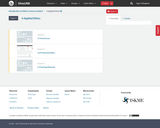
155 Results

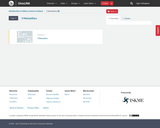
- Subject:
- Arts and Humanities
- Philosophy
- Material Type:
- Unit of Study
- Provider:
- Ohio Open Ed Collaborative
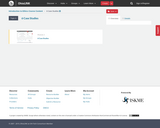
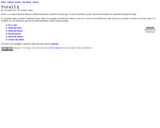
forall x is an introduction to sentential logic and first-order predicate logic with identity, logical systems that significantly influenced twentieth-century analytic philosophy. After working through the material in this book, a student should be able to understand most quantified expressions that arise in their philosophical reading.
This books treats symbolization, formal semantics, and proof theory for each language. The discussion of formal semantics is more direct than in many introductory texts. Although forall x does not contain proofs of soundness and completeness, it lays the groundwork for understanding why these are things that need to be proven.
- Subject:
- Arts and Humanities
- Philosophy
- Material Type:
- Textbook
- Provider:
- forall x
- Author:
- P.D. Magnus
- Date Added:
- 01/01/2012
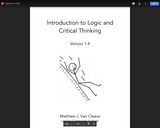
This is an introductory textbook in logic and critical thinking. The goal of the textbook is to provide the reader with a set of tools and skills that will enable them to identify and evaluate arguments. The book is intended for an introductory course that covers both formal and informal logic. As such, it is not a formal logic textbook, but is closer to what one would find marketed as a critical thinking textbook. Downloadable as a pdf file.
- Subject:
- Arts and Humanities
- Philosophy
- Material Type:
- Textbook
- Provider:
- Lansing Community College
- Author:
- Matthew J. Van Cleave
- Date Added:
- 01/04/2016

The goal of this text is to present philosophy to newcomers as a living discipline with historical roots. While a few early chapters are historically organized, my goal in the historical chapters is to trace a developmental progression of thought that introduces basic philosophical methods and frames issues that remain relevant today. Later chapters are topically organized. These include philosophy of science and philosophy of mind, areas where philosophy has shown dramatic recent progress. This text concludes with four chapters on ethics, broadly construed. I cover traditional theories of right action in the third of these. Students are first invited first to think about what is good for themselves and their relationships in a chapter of love and happiness. Next a few meta-ethical issues are considered; namely, whether they are moral truths and if so what makes them so. The end of the ethics sequence addresses social justice, what it is for one’s community to be good. Our sphere of concern expands progressively through these chapters. Our inquiry recapitulates the course of development into moral maturity
- Subject:
- Arts and Humanities
- Philosophy
- Material Type:
- Textbook
- Provider:
- Bellevue College
- Author:
- W. Russ Payne
- Date Added:
- 04/27/2020
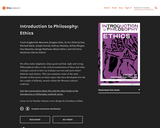
We often make judgments about good and bad, right and wrong. Philosophical ethics is the critical examination of these and other concepts central to how we evaluate our own and each others’ behavior and choices.
This text examines some of the main threads of discussion on these topics that have developed over the last couple of millenia, mostly within the Western cultural tradition. It considers basic questions about moral and ethical judgment: Is there such a thing as something that is really right or really wrong independent of time, place and perspective? What is the relationship between religion and ethics? How can we reconcile self-interest and ethics? Is it ever acceptable to harm one person in order to help others? What do recent discussions in evolutionary biology or have to say about human moral systems? What is the relation between gender and ethics? The authors invite you to participate in their exploration of these and many other questions in philosophical ethics.
If you are adopting or adapting this book for a course, please let us know on our adoption form for the Introduction to Philosophy open textbook series: https://docs.google.com/forms/d/e/1FAIpQLSdwf2E7bRGvWefjhNZ07kgpgnNFxVxxp-iidPE5gfDBQNGBGg/viewform?usp=sf_link.
- Subject:
- Arts and Humanities
- Philosophy
- Material Type:
- Textbook
- Provider:
- Rebus Community
- Author:
- Christina Hendricks (Series Editor)
- Douglas Giles
- Frank Aragbonfoh Abumere
- George Matthews (Book Editor)
- Jeffrey Morgan
- Joseph Kranak
- Kathryn MacKay
- Michael Klenk
- Paul Rezkalla
- Ya-Yun (Sherry) Kao
- Date Added:
- 04/27/2020
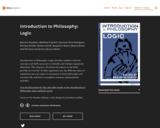
Introduction to Philosophy: Logic provides students with the concepts and skills necessary to identify and evaluate arguments effectively. The chapters, all written by experts in the field, provide an overview of what arguments are, the different types of arguments one can expect to encounter in both philosophy and everyday life, and how to recognise common argumentative mistakes.
- Subject:
- Arts and Humanities
- Philosophy
- Material Type:
- Textbook
- Provider:
- Rebus Community
- Author:
- Ben Martin
- Christina Hendricks
- Date Added:
- 11/02/2021
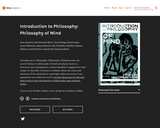
Introduction to Philosophy: Philosophy of Mind (edited by Heather Salazar) surveys the central themes in philosophy of mind and places them in a historical and contemporary context intended to engage first-time readers in the field. It focuses on debates about the status and character of the mind and its seemingly subjective nature in an apparently more objective world.
Written by experts and emerging researchers in their subject areas, each chapter brings clarity to complex material and involves the reader through a wealth of examples. Many chapters include applications of the concepts to film and literature that will stimulate readers to firmly grasp the significance of the philosophy of mind. Subjects covered are how the mind fits into the material world and how to analyze its properties. In that vein, substance dualism, materialism, behaviorism, functionalism, and property dualism are all explored.
In addition, it includes insightful contributions on how to explain seemingly subjective feelings, the mystery of consciousness, conceptual understanding of the world outside of the mind, and free will. The book is designed to be used alone or alongside a reader of historical and contemporary original sources.
If you are adopting or adapting this book for a course, please let us know on our adoption form for the Introduction to Philosophy open textbook series: https://docs.google.com/forms/d/e/1FAIpQLSdwf2E7bRGvWefjhNZ07kgpgnNFxVxxp-iidPE5gfDBQNGBGg/viewform?usp=sf_link.
- Subject:
- Arts and Humanities
- Philosophy
- Material Type:
- Textbook
- Provider:
- Rebus Community
- Author:
- Christina Hendricks
- Daniel Haas
- Elly Vintiadis
- Eran Asoulin
- Heather Salazar
- Henry Shevlin
- Jason Newman
- Paul Richard Blum
- Tony Cheng
- Date Added:
- 04/27/2020
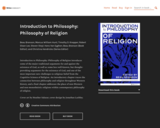
Introduction to Philosophy: Philosophy of Religion introduces some of the major traditional arguments for and against the existence of God, as well as some less well-known, but thought-provoking arguments for the existence of God, and one of the most important new challenges to religious belief from the Cognitive Science of Religion. An introductory chapter traces the connection between philosophy and religion throughout Western history, and a final chapter addresses the place of non-Western and non-monotheistic religions within contemporary philosophy of religion.
- Subject:
- Arts and Humanities
- Philosophy
- Material Type:
- Textbook
- Provider:
- Rebus Community
- Author:
- Beau Branson
- Christina Hendricks
- Date Added:
- 11/02/2021
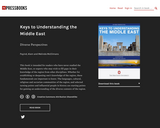
This book is intended for readers who have never studied the Middle East, or experts who may wish to fill gaps in their knowledge of the region from other disciplines. Whether for establishing or deepening one's knowledge of the region, these fundamentals are important to know. The languages, cultural, religious and sectarian communities of the region, and selected turning points and influential people in history are starting points for gaining an understanding of the diverse contexts of the region. It isbased on introductoryand graduatecourseson thecontemporaryMiddle East, which the Center's director, Dr. Alam Payind, has been teaching for the past 30 years. The book's co-author,Melinda McClimans,hastaught these and other courses with him, as well as her own,for the past 15years. The material isintendedengage with diverse – even conflicting – culturaland historicalperspectives,andways of perceivingboth Middle Easternandworld historyfrom perspectives within the region. It is not intended to reinforce a monolithic or matter-of-fact perception of the region.For this and many other reasons, images are an important aspect of the knowledge presented. Each chapter starts with links to its image galleries, along with other visual aids and key elements.
- Subject:
- Arts and Humanities
- World Cultures
- Material Type:
- Textbook
- Provider:
- The Ohio State University
- Provider Set:
- Pressbooks
- Author:
- Alam Payind
- Melinda McClimans
- Date Added:
- 01/01/2017
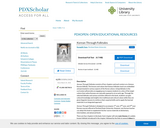
Korean Through Folktales consists of four chapters and each centers on a famous Korean folktale. The lessons and values that famous folktales teach are embedded and permeated in various aspects of the Koran culture. Using folktales in the curriculum will provide an engaging way to expose students to a slice of the target culture that native Koreans are naturally exposed to at an early age. Through the selected folktales and various activities offered in the book, students can gain cultural knowledge and insights into traditional and cultural values while they are given linguistic lessons to reinforce their acquired skills and to apply the learned materials in an integrated approach.
Korean Through Folktales is designed to accompany 1st-year, 2nd-year, and 3rd-year Korean courses offered at Portland State University. However, any Korean teacher can adopt this book to supplement his/her course materials at elementary, intermediate, and advanced levels.
There are four chapters in the book. Each chapter will note main themes of a widely known folktale introduced in the chapter, followed by the links to several videos to watch and get a gist or a background of the story. The ensuing section will introduce important elements and symbolism embedded in the story so as to provide insights and to enhance the depth of appreciation. After that, three versions of the folktale are presented for different levels, followed by grammar lessons, exercises, and tasks.
Traces of folktales and allusions to them are evident in cultural products that many students enjoy, such as dramas, movies, and music. Therefore, knowledge in folktales will help students make cultural connections as well as enrich their experience of learning the Korean language.
- Subject:
- Arts and Humanities
- Languages
- Material Type:
- Textbook
- Provider:
- Portland State University
- Provider Set:
- PDXOpen
- Author:
- KyungAh Yoon
- Date Added:
- 03/25/2016
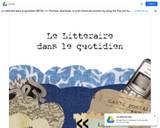
Le Littéraire dans le quotidien is an open textbook for use in French courses. The Literary in the Everyday represents a new pedagogical approach to reading and writing at the lower levels and is applicable to all languages. Teachers of foreign languages besides French can read about the approach in the Teacher's Guide. Go to Google Drive for individual chapters. Additionally, the Foreign Languages & The Literary in the Everyday (FLLITE) Project, a joint initiative of COERLL and CERCLL, two national foreign language resource centers, offers open resources for professional development in the publication of CC licensed FLLITE lessons in any language. Go to the FLLITE website for the lesson archive.
- Subject:
- Arts and Humanities
- Languages
- Material Type:
- Textbook
- Provider:
- University of Texas at Austin
- Provider Set:
- COERLL
- Author:
- Joanna Luks
- Date Added:
- 04/27/2020
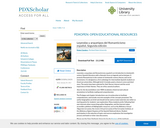
Leyendas y arquetipos del Romanticismo español is an introduction to nineteenth-century Spanish literature with a thematic focus on legends and archetypes. It presents Romanticism in the context of nineteenth-century literary and social movements. It is designed as a first anthology for intermediate Spanish students at American universities. Although brief, it includes poetry, drama in verse and short story. The works have been selected for their literary interest and the social importance of their themes. They are all by canonical authors.
- Subject:
- Arts and Humanities
- Literature
- Material Type:
- Textbook
- Provider:
- Portland State University
- Provider Set:
- PDXOpen
- Author:
- Robert Sanders
- Date Added:
- 01/04/2017
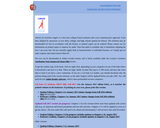
Liberté, by Gretchen Angelo, is a first-year college French textbook with a true communicative approach. It has been adopted by instructors at over thirty colleges and high schools (partial list below). The textbook may be downloaded for free in accordance with the license, or printed copies can be ordered. Please contact me for information on printed copies or requests for audio. Note that audio is available only to institutions adopting the text; I am sorry, but I do not currently supply them to homeschoolers or individual learners, as I simply get too many requests and cannot answer them all.
- Subject:
- Arts and Humanities
- Languages
- Material Type:
- Textbook
- Provider:
- Light and Matter
- Provider Set:
- Light and Matter Books
- Author:
- Gretchen Angelo
- Date Added:
- 04/27/2020
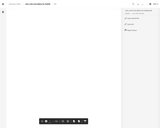
One of the most important things we can do to hold ourselves accountable for our learning is to engage in goal setting and metacognition—a fancy term for thinking about the way we think and learn. The goals we set should be specific and achievable. Something like “Speak Spanish” is too broad, we need to focus on the steps we need to take to get there and the signs that we will see as proof of our progress.
- Subject:
- Arts and Humanities
- Languages
- Material Type:
- Textbook
- Author:
- Erin Huebener
- Jessica Steinberg
- Date Added:
- 04/27/2020

A course designed to explore the evolution of African-American musical genres and their cultural and historical perspectives, from the beginning of slavery in America to the present. Through readings, critical listening and videos encompassing topics of black music history, we will explore connections between sacred and secular, popular and classical, and folk and commercial music, through many genres and styles, including: spirituals, ragtime, blues, jazz, swing opera, musical theatre, rhythm and blues, soul, disco, funk, hip-hop and rap.
- Subject:
- Arts and Humanities
- History
- Material Type:
- Full Course
- Author:
- Kimberly Buczek
- Date Added:
- 06/24/2022
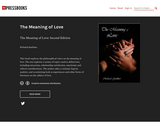
This book explores the philosophical views on the meaning of love. The text explores a variety of topics used to define love, including attraction, relationship satisfaction, emotional, and ethical considerations. The author takes a rational, logical, analytic, and scrutinizing look at experiences and other forms of literature on the subject of love.
- Subject:
- Arts and Humanities
- Philosophy
- Material Type:
- Textbook
- Author:
- Richard Garlikov
- Date Added:
- 04/27/2020
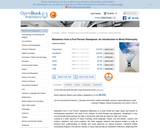
Metaethics from a First Person Standpoint addresses in a novel format the major topics and themes of contemporary metaethics, the study of the analysis of moral thought and judgement. Metathetics is less concerned with what practices are right or wrong than with what we mean by ‘right’ and ‘wrong.’
Looking at a wide spectrum of topics including moral language, realism and anti-realism, reasons and motives, relativism, and moral progress, this book engages students and general readers in order to enhance their understanding of morality and moral discourse as cultural practices. Catherine Wilson innovatively employs a first-person narrator to report step-by-step an individual’s reflections, beginning from a position of radical scepticism, on the possibility of objective moral knowledge. The reader is invited to follow along with this reasoning, and to challenge or agree with each major point. Incrementally, the narrator is led to certain definite conclusions about ‘oughts’ and norms in connection with self-interest, prudence, social norms, and finally morality. Scepticism is overcome, and the narrator arrives at a good understanding of how moral knowledge and moral progress are possible, though frequently long in coming.
Accessibly written, Metaethics from a First Person Standpoint presupposes no prior training in philosophy and is a must-read for philosophers, students and general readers interested in gaining a better understanding of morality as a personal philosophical quest.
- Subject:
- Arts and Humanities
- Philosophy
- Material Type:
- Textbook
- Provider:
- Open Book Publishers
- Author:
- Catherine Wilson
- Date Added:
- 04/27/2020
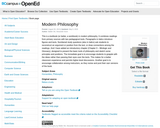
This is a textbook (or better, a workbook) in modern philosophy. It combines readings from primary sources with two pedagogical tools. Paragraphs in italics introduce figures and texts. Numbered study questions (also in italics) ask students to reconstruct an argument or position from the text, or draw connections among the readings. And I have added an introductory chapter (Chapter 0 Minilogic and Glossary), designed to present the basic tools of philosophy and sketch some principles and positions. The immediate goal is to encourage students to grapple with the ideas rather than passing their eyes over the texts. This makes for a better classroom experience and permits higher-level discussions. Another goal is to encourage collaboration among instructors, as they revise and post their own versions of the book.
- Subject:
- Arts and Humanities
- Philosophy
- Material Type:
- Textbook
- Provider:
- BCcampus
- Provider Set:
- BCcampus Faculty Reviewed Open Textbooks
- Author:
- Dunn, Alexander
- Ott, Walter
- Date Added:
- 02/06/2015